Richard Swan's Blog, page 5
September 9, 2021
The Dying Squad by Adam Simcox - Review
Dying is hell; solving your own murder is purgatory.
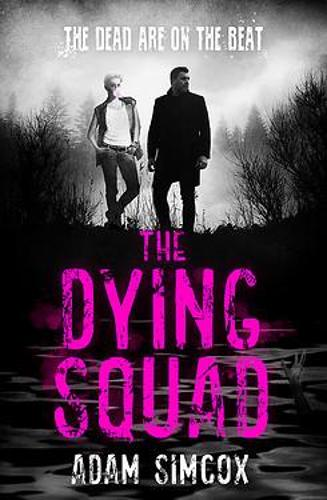
All right! Just finished this last night, after having rattled through the last 50 pages or so. What a ride!
But what is it about, you shriek at the laptop screen, batting at it like a confused and angry ape.
The Dying Squad follows follows Detective Joe Lazarus, a man who is killed about 3 pages in to the book and who abruptly and unceremoniously enters the spirit dimension, a purgatorial plane home to the unwashed masses of souls who live out their afterlives in a sort of livestock-esque manner. Joe’s spirit guide is Daisy May (one of the best characters I’ve read in recent years) a wise-cracking, foulmouthed teenage girl who has all the best lines in the book. Daisy May’s job is to help Joe Lazarus transition from the mortal coil to the immortal coil, and in so doing induct him into the Dying Squad, a sort of detective force of the recently-deceased whose job it is to discover the form and nature of their own deaths. Joe is subsequently repaired to the freezing Lincolnshire countryside to investigate a drugs ring that he was investigating before he was killed, whilst in the afterlife, the purgatorial Dispossessed are starting a revolution courtesy of the realm’s matriarch’s sister, who has recently returned from Hell and is stirring up trouble.
It’s difficult to define what genre this is. It’s interesting because it could, but for a few bits, be a police procedural; but at the same time there is this fascinating afterlife element which puts it more in the vein of urban fantasy. I would have compared it to Charlie Stross’s Laundry Files, or Mike Carey’s Felix Castor series.
“Get a fucking grip, Joe thought. Houses don’t bruise, they don’t need to heal, and nothing haunts them.
Although that wasn’t true, because the fact was […] he’d been killed in this house, and here he was, back at the scene of the crime, trying to find out who’d done it. If it wasn’t an actual haunting, it was a solid homage to one.”
I really liked this book. It just rattles along at such a pace. It’s so tight, everything is in furtherance of the plot. The reveals come thick and fast, some I saw coming, more I didn’t, whilst the supernatural bits add a spooky, at times genuinely chilling element to proceedings. The Xylophone Man in particular, Hell’s enforcer, a man who delights in wearing an elephant skull for a head and devouring naughty souls who’ve breached the barrier between the living and the dead, is a fantastically horrible character, and not overused as must’ve been the temptation. Basically Pyramid Head from Silent Hill, which shitted me right up as a 14 year old:
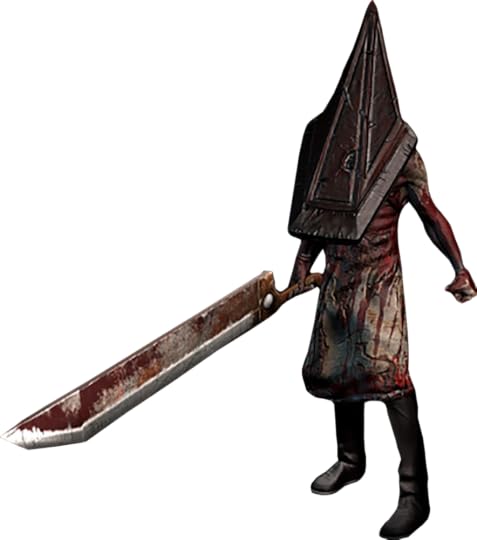
The writing style is very punky, very wry, almost as though Simcox is stood watching you read with an eyebrow cocked the entire time. It’s got some very amusing, blink and you miss it one-liners:
“A blazing fire separated the group. An elderly man and woman sat on one side, screaming expletives at teenagers on the other, harsh Slavic tones Joe would have identified as Bulgarian if his life had depended on it, or Romanian if it hadn’t.”
But the same time Simcox isn’t above giving us a good lame joke:
“Peeling back the cover, he removed the pen from his pocket, knocking it against his teeth. Just think of yourself as a ghost-writer, Daisy May had said when she’d given it to him, taking a good thirty seconds to laugh at her own joke.”
The book is certainly a bleak one. Were it not for the caustic comic relief provided by Daisy May, it almost would have been too bleak for me. Simcox pulls no punches when it comes to the seedy, sordid nature of the drugs ring and the decaying suburbs, country villages and seaside towns of Lincolnshire. It is also an undoubtedly violent book, and tackles all manner of shitty human behaviour between its covers which may necessitate a more light-hearted read afterwards to cleanse the palate.
Notwithstanding this, I definitely want more. I want to read more Daisy May and I want to spend more time in the afterlife (metaphorically speaking) and learn about the mechanics of it all. Simcox does not overburden us with details of the spirit dimensions, instead drip feeding us bits and pieces, which is just enough to whet the appetite without overdoing it. Without giving away any spoilers, the book is set up nicely for more ghostly crime solving capers - and I will certainly be in line for the next instalment of the series.
My verdict? Buy this now and put some money in Simcox's pocket. I want TDS to become the next Dresden Files!
August 25, 2021
Pariah, by Dan Abnett: Short Review
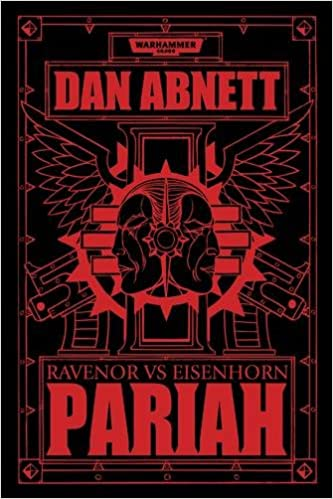
This is the first book in the third trilogy of Dan Abnett’s Inquisitorial “trilogy of trilogies”, the first two being Eisenhorn and Ravenor (though Eisenhorn is now of course a quadrilogy thanks to the addition of The Magos). Blurb:
In the city of Queen Mab, nothing is quite as it seems. Pariah, spy and Inquisitorial agent, Alizebeth Bequin is all of these things and yet none of them. An enigma, even to herself, she is caught between Inquisitors Gregor Eisenhorn and Gideon Ravenor, former allies now enemies who are playing a shadow game against a mysterious and deadly foe. Coveted by the Archenemy, pursued by the Inquisition, Bequin becomes embroiled in a dark plot of which she knows not her role or purpose. Helped by a disparate group of allies, she must unravel the secrets of her life and past if she is to survive a coming battle in which the line between friends and foes is fatally blurred.
It took me a little while to get into this one. Stylistically it's very different from the Eisenhorn and Ravenor trilogies, which is not a bad thing in and of itself, of course, but I think it just ran counter to my expectations. As usual, Abnett's worldbuilding is second-to-none, filled with those little throwaway names and details which make a setting so believable. Geographically it's a much more focused novel in the same way the Magos was - no planet hopping or huge interstellar intrigues here, as in the first two trilogies. People expecting a rehash of those will probably be disappointed. I would also say that this book will be practically unintelligible, plotwise, for those not intricately familiar with Eisenhorn and Ravenor; a great deal of existing knowledge and back story is assumed, which was not a problem for me, but would be problem for someone unfamiliar with the broader series and context. There are also a large number of small blink-and-you-miss-it details which, again, would be lost on someone who had not read the first two trilogies (and, dare I say, recently).
But, generally, another solid inquisitorial effort from Abnett which I cannot find any great fault with. An "I liked it" 3 stars.
August 23, 2021
Empire of the Wolf #2: Progress Update 23/08
I recently hit about 130k on the first draft. I’m doing something I haven’t done before with this draft; I’m actually not going to write the last chapter or two at all until I’ve gone back and done the first pass edit. Normally I find the endings change anyway, sometimes in substantial ways, and I need to get a better feel of the various converging threads which I’ve largely forgotten about since I started this draft last year. This means that book 2 will be slightly longer than book 1, as always seems to be the case with these trilogies; probably between five and ten thousand words longer, putting me in that 140k word sweet spot.
My small cohort of beta readers, three close friends whose opinions I trust and value highly, are now in receipt of the very rough first draft. Normally I would do a first-pass myself before letting anybody see it, but now with actual contractual deadlines to meet, I need to expedite the process slightly. This will mean I can do all of my edits together in one fell swoop. This also gives me the opportunity to take some time away from the manuscript entirely, a good 2 to 3 weeks is normally needed to reset my enthusiasm for this particular book, and gives me a chance to spend some creative energy on another post-apocalyptic sci-fi novel I’ve had in the back of my mind for a while.
This first draft promises to be a slightly frustrating reading experience; last year I developed very bad RSI in my forearms after a very intense piece of legal advice which ended up being about ten thousand words written over the space of three days. Consequently my firm bought me Dragon Professional dictation software, which by and large is very good, but does mean that a lot of homophones can slip in. Really the first pass is just for broad plot, thematic and character consistency strokes, but still, it’s not going to be a fun read - so thanks to TJ, George and Will.
That’s all for now, I’m hoping to post a few short book reviews in the next couple of weeks as well.
Adios Amigos
July 22, 2021
Empire of the Wolf #2: Progress Update
I hit 120,000 words on the first draft of book 2 last night. Progress is slowing thanks to a lack of planning for these final chapters; I like to give myself a bit of wiggle room toward the end of the book since matters can change dramatically during the course of the first draft. The unfortunate downside to this is without any kind of plan in place, I am freewheeling slightly, which increases the mental burden and slows the whole process down a little. There are a few very cool parts that I am looking forward to writing, including the deaths of some characters, but a few thousand words to go before I get there.
In exciting news, a run of hundreds of special signed proofs of book one is in the pipeline at Orbit, and hopefully these will come into existence in the next couple of weeks.
More to come soon!
May 15, 2020
Exciting news!
You may remember, my legions of followers, that I mentioned I was writing a novel called "Emperor's Justice" and that I didn't want to chuck it on Amazon Kindle as a self-published title because I felt I wanted to try and get traditionally published?
Well, I've taken one (hopefully rather large) step forward to that sweet, sweet goal, as Harry Illingworth of the DHH Literary Agency has just signed me on as one of his represented authors. All being well, this means that one day I might actually get a book up on the shelves!
As you can appreciate this is tremendously exciting news for me. It also means that it will be a while until you see any more fiction content from me--but I am sure that it will be worth the wait!
Excitedly yours
Rich
October 21, 2019
Where have I been?
In the time-honoured tradition of blogs everywhere, I've let this fall by the wayside. This is because whilst I have been working on a novel, it's not one that I plan to self-publish.
I have enjoyed self publishing and all the perks that go with it, like complete creative freedom and coming up with my own book covers (the idea, not the actual artwork - that I leave to the pros). However the allure of having a book "properly" published remains one of my life's few goals and I'd like to give it a bloody good go.
Consequently, I've not really been able to add extracts to the Stone Temple Library due to the one-in-a-trillion chance that someone picks it up. However, I can of course say that it is a medieval fantasy called "Emperor's Justice", and is basically a medieval Judge Dredd police procedural / courtroom drama with some heavy political / religious upheaval happening in the background.
I'm currently sending the book out to agents to see if anyone is interested so in the meantime I am going to get cracking on my next book. The usual paralysis has already set in; I have a large roster of ideas each vying for 6 months-1 year of my brainspace and the book I had planned to write, a really gnarly space opera about a former space fighter pilot turned diplomat on a planet ravaged by a genetically engineered virus, has lost some of its appeal to me. I think I spent too much time planning it.
I have an old cyberpunk novel on the stocks which is about 10k words done - feeling like I might pick that one back up and run with it for a little while. But at this point I really don't know.
ATB
Rich
June 13, 2019
The Warmaster, Dan Abnett: Review
I think I’ve said this multiple times over the course of my blog posts, but I’ve been reading the Gaunt’s Ghosts series for about 15 years now. It remains one of my favourite series of books. Picking up a new one feels like coming home, comfort food for the mind, taking me back to those long summers spent in the Lincolnshire countryside where I first started writing my own science fiction. Back then the Ghosts and the Black Library generally provided me with a rich seam of inspiration, and I always enjoy thinking back to the times when I would be out walking the dogs for hours, dreaming up new ideas and storylines.
Given how important they are to me, it’s about time I did a proper long review of at least one of them. I should probably do a series retrospective at some point. In the meantime, here is my review of the Warmaster:
Intro
I love the series. There aren’t really any bad books, just weaker and stronger ones. Abnett has been releasing them relatively regularly now for decades, and the old unofficial strapline “like Sharpe in space” pretty much still holds true. They have the well-deserved reputation as being BL’s flagship series (probably now knocked off that perch by the Horus Heresy novels, although I haven’t read beyond the fourth one of those and that was some years ago). Needless to say, they have a special place in my heart, as close a companion as any human friend.
GG has been retroactively split into arcs: the Founding, the Saint, the Lost, and now the Victory, which are linked thematically. We are currently in the somewhat spoilery-titled the “Victory”, though I suppose technically we don’t know whose victory we are concerning ourselves with.
Plot Summary
[The below plot summary contains mild spoilers so skip it if you’re yet to read the book].
With the Warmaster, Gaunt and his men have just returned from their desperate Salvation’s Reach mission, recovering a cache of vital, potentially war-winning Archenemy intelligence in the process. However, thanks to a Warp accident en route back to relative safety, the Ghosts—and everyone else on the ship—lose ten years of real time. Gaunt and his men are presumed lost, and when they finally get back to safety, Gaunt finds himself in the slightly uncomfortable position of having been posthumously lauded as a hero of the Imperium—and promoted to Lord Militant to boot.
Now back on one of the key worlds of the Sabbat campaign, Urdesh, the crusade’s lords militant bring Gaunt back into the fold, turn the posthumous promotion into a humous one, and begin the difficult task of trying to win the campaign whilst simultaneously plotting to overthrow their brilliant but reclusive and slightly insane (and eponymous) warmaster.
In true Abnett form, battles are fought (both the war kind and the political kind) and characters’ and story arcs are developed. In other words, hijinks ensue, and a generally bad time is had by all.
The Bad
OK, so what isn’t so good about the Warmaster? Well, the ending for starters. I do not tend to read reviews or interviews or generally read about authors or their lives, so I was a bit out of the loop on this, but apparently Abnett forewarned readers that the Warmaster would end on a cliff-hanger.
Although, I’m not sure that cliff-hanger is necessarily the right word; it’s not abrupt and dramatic enough to be a cliff-hanger. It’s more just a petering out. It’s the kind of ending you’d get at the end of a chapter, or a part of a book, rather than an entire book.
Normally with this kind of ending, where you’re writing another book in a long running series, you tie up a few sub-stories by the end so that the reader achieves some closure, whilst leaving the meta-arc running. Abnett is usually very good at this; read any given GG book and you’ll find that an individual battle or engagement is won (or at least brought to a conclusion) whilst the wider war rumbles on.
In the Warmaster, nothing ends. The main war hasn’t ended, the battle for Urdesh hasn’t ended… hell, most of the minor plot threads haven’t even really started.
The result is that the Warmaster feels like the first half of a book split into two parts. This may well have been the intention, but if you’re like me and you don’t know the IRL context or background or the author’s thoughts on the matter, all you’ve got to go on is the book itself. So that was a bit pants, although really it doesn’t matter too much. When you’re on book 14 of a series, the odd cliff-hanger can be forgiven.
What else? Well, not much really, except perhaps the volume of characters. GG has been running for so long now that we really are into a cast of thousands. Unlike many other mil-si-fi authors (or just military fiction authors), Abnett eschews prefacing his books with a regimental structure for reference, even a basic one. One can only assume that such a structure does exist for Abnett himself, probably, we might conjecture, in Microsoft PowerPoint or Excel, with new sheets for each book with lists of character deaths etc.
The point is, it gets hard to keep up with all the names. Some are easy because they are primary or mid-tier characters in and of themselves; Mkoll, Larkin, Blenner, Curth, Criid, Wilder, Meryn, Rawne, Brostin, etc. etc.; these are people who have been with us for a very long time and have their own distinct feel (see The Good below). But there are many others who are just names, even familiar names. Some names are just throwaways, redshirts who we don’t care about. But there are dozens (literally) of names which I know I’ve seen many times before but I just can’t quite remember who they are. This becomes more frustrating when some of the Ghosts themselves are the baddies, running little criminal rings within the regiment etc, because then it matters who the minor characters are. Are they good Ghosts, bad Ghosts, redshirt Ghosts? When you read a GG novel once every one or two years like I do, these minor and mid-tier characters quickly fade from memory and whilst Abnett does go to some lengths to remind us of what’s going on, he also probably expects too much of the reader’s memory.
I imagine the answer to why Abnett does not have a structure is “because it would be massive” but I don’t know. If you can get maps in there, you can get an organogram. Look at James Jones’ The Thin Red Line as an exemplar of how to do it.
The Good
I’m pleased to say that despite the gripes above, I thought the Warmaster was probably one of the best in the series. Abnett has always been a good writer, but like Cornwall with Sharpe, one can see in the early books a writer perhaps still honing his long-form craft. Here, the writing is assured. I imagine Abnett can hammer out books like the Warmaster now with relative ease and probably relatively little editing. The pacing is all there, the prose flows, and the book is generally very engaging.
When I was a teenager I loved the huge battles, and one of Abnett’s true skills is writing battle scenes, even ones that last basically the entire book (ref. the fan-favourite Necropolis, or one of my own favourites, Sabbat Martyr). As an amateur author myself, I often find writing battle scenes that are engaging very difficult and actually quite boring, but Abnett is really an auteur when it comes to this. It is little wonder that BL shovels all their flagship books his way.
Now I’m a little older (30 trips round the sun this year), however, I find that my interest in the battle scenes wanes. I sense that, perhaps in some respects, Abnett’s does too. I’ve noticed in his novels of late we are treated to lengthy scenes behind the action; a greater focus on regimental life, of the nightmarish logistics of transporting the regiment, of the relationships between the retinue and the soldiers, of internal struggles, criminal schemes, sexual tensions (PG rated!), of the difficulties of commanding a crusade, the strategies, the meta campaign, the Ordos interrogations, the departmental conflicts, church vs state, inquisition vs military… Here the inspirations from Abnett’s other wildly popular Eisenhorn and Ravenor works are clear. Whereas before this stuff would have been window dressing, a mere precursor contriving to gett the Ghosts to the front lines as soon as possible, now we get as much as half the book or more dedicated to these intrigues.
This fresh approach is to be commended to the highest degree. The books are so much richer and more interesting with these different angles explored. With the Warmaster I found myself reading the battles very quickly to get back to the political manoeuvrings at high command. I do hope that Abnett continues in this vein, because the books are so much better and more mature as a consequence.
Similarly, the characters have real depth now. The cowardly but charming Blenner is a joy to read. Curth is becoming a reckless, depressed alcoholic. Mkoll is becoming a joyless old man. Rawne’s arc, from sullen, vengeance-seeking asshole to respected brevet colonel of the regiment, is really satisfying. Zweil is still the rambling, awkward and mad old priest. Kolea is the tortured father (and I sense not long for this world). These characters, once somewhat two-dimensional, have really come into their own, and it’s clear why Abnett chooses these people to tentpole the novel.
With these adulations I therefore add this book to my unofficial and uncodified list of the best Gaunt’s Ghosts books.
The Ugly
Never judge a book by its cover, goes the old adage.
I have been buying these books for years, and I have been getting them in paperback in this style of cover (and which is awesome):
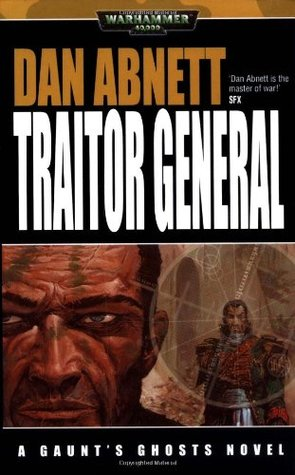
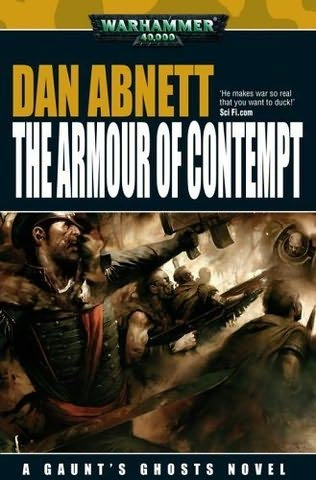
Now we have this (which admittedly isn't awful but it's certainly a lot worse):
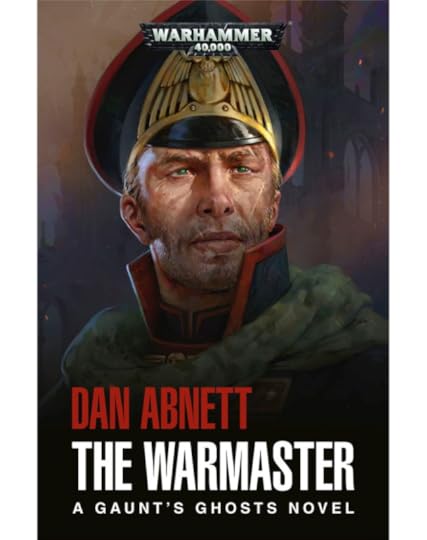
And for the omnibus editions, sweet lord we now have this smoking trash fire:
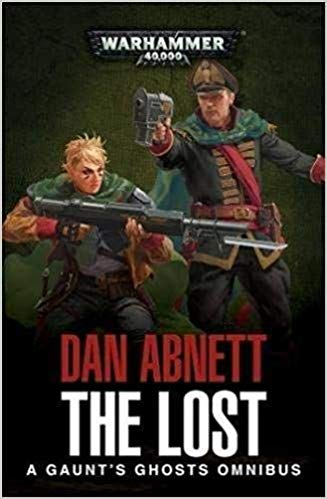
Which seriously used to be this (just on another plane of existence in terms of high quality):
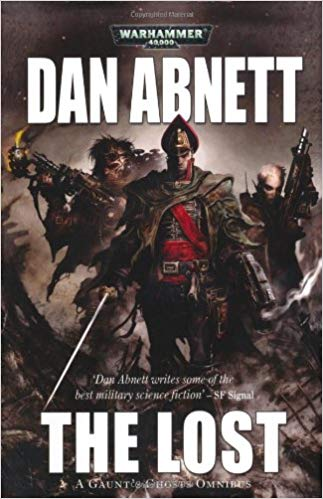
Whilst the Warmaster’s cover is not, in and of itself, that bad, the omnibus editions are woeful. We lose the gritty, realistic / artistic stylings of the previous covers in favour of these pseudo-anime creations which look cartoonish and surprisingly undynamic. It’s like Yu-Gi-Oh fan art. It also really ruins the look and symmetry of my bookshelf as the newer books are bigger and more padded with space.
Sigh. I know it is wrong to fixate on the cover art (is it though? Does the cover not ultimtately guide your thoughts, however subconscious, on the feel of the book), and ultimately it’s the writing I love and enjoy, and I will of course continue to buy them. But I just wish they hadn’t tinkered with the artwork so.
Now on to the Anarch!



